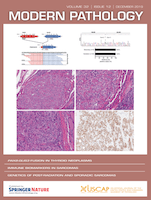
MODERN PATHOLOGY
Scope & Guideline
Exploring the Depths of Forensic Medicine
Introduction
Aims and Scopes
- Molecular Pathology:
The journal extensively covers studies that explore the molecular mechanisms underlying various diseases, particularly cancers, and the implications of genetic alterations on diagnosis and treatment. - Digital Pathology and AI Integration:
There is a strong emphasis on the application of digital pathology and artificial intelligence in diagnostic processes, which aims to improve efficiency, accuracy, and reproducibility in pathology practices. - Tumor Microenvironment and Immunology:
Research focusing on the tumor microenvironment, including immune cell interactions and their prognostic implications, is a key area of interest, reflecting the growing importance of immunotherapy and immune profiling. - Histopathological Classification and Grading:
The journal discusses advancements in histopathological classification systems and grading criteria for various tumors, contributing to more precise prognostic assessments and treatment strategies. - Clinical and Pathologic Correlations:
A significant focus is placed on the correlation between clinical findings and pathologic features, helping to bridge the gap between pathology and clinical practice.
Trending and Emerging
- Precision Medicine and Genomic Profiling:
An increasing number of studies focus on the use of genomic profiling to inform treatment decisions, particularly in oncology, emphasizing personalized approaches to patient care. - Artificial Intelligence in Pathology:
The integration of AI tools for diagnostic purposes is rapidly growing, with numerous papers exploring their applications in improving diagnostic accuracy and workflow efficiency. - Immune Checkpoint Inhibitors and Tumor Immunology:
Research related to immune checkpoint inhibitors, their mechanisms, and their impact on tumor microenvironments is trending, reflecting the importance of immunotherapy in current cancer treatment paradigms. - Multi-Omic Approaches:
There is a notable trend toward utilizing multi-omic profiles (genomic, transcriptomic, proteomic) to gain a comprehensive understanding of tumor biology, which aids in better diagnostic and prognostic assessments. - Digital Pathology Advances:
The use of digital pathology for remote diagnostics, education, and research is on the rise, particularly in light of the COVID-19 pandemic, which has accelerated the adoption of virtual tools in pathology.
Declining or Waning
- Traditional Diagnostic Methods:
There seems to be a waning interest in traditional diagnostic methods that do not incorporate molecular or digital enhancements, as the field moves towards more innovative, technology-driven approaches. - Basic Histopathology Without Molecular Context:
Studies focusing solely on basic histopathological features without integrating molecular insights are becoming less common, as researchers increasingly recognize the need for a more comprehensive understanding of disease. - Generalized Cancer Research:
Broad studies of cancer without specific focus on molecular subtypes or targeted therapies are less frequently published, as the field shifts towards personalized medicine and precision pathology.
Similar Journals
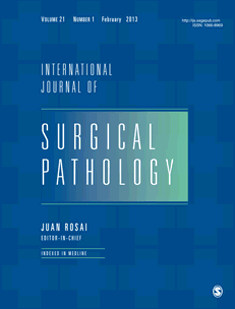
INTERNATIONAL JOURNAL OF SURGICAL PATHOLOGY
Connecting Clinical Practice with Cutting-edge ResearchInternational Journal of Surgical Pathology is a distinguished peer-reviewed journal published by SAGE Publications Inc since 1993, specializing in the intricate fields of surgical pathology, anatomy, and surgery. With an ISSN of 1066-8969 and an E-ISSN of 1940-2465, this journal has been at the forefront of disseminating vital research that helps shape clinical practices and understanding in surgical diagnostics. Ranked in the Q2 category for Anatomy and garnering Q3 status in Pathology and Forensic Medicine as well as Surgery, the journal holds a commendable position within its field as reflected by its Scopus ranks. The impact factor underscores its influence and relevance, making it an essential resource for researchers, professionals, and students alike, looking to stay abreast of advancements in surgical pathology. However, please note that the journal does not currently offer open access options. As it converges through the years from 1993 to 2024, the International Journal of Surgical Pathology continues to uphold its commitment to excellence in medical research.
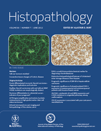
HISTOPATHOLOGY
Connecting Scholars to Cutting-edge Pathological DiscoveriesHISTOPATHOLOGY is a premier scholarly journal published by WILEY, targeting the fields of histology, pathology, and forensic medicine. With an ISSN of 0309-0167 and an E-ISSN of 1365-2559, this esteemed journal has maintained a strong academic presence since its inception in 1977. Boasting an impressive Q1 ranking in crucial categories such as Histology and Pathology, it ranks 13th out of 208 in Pathology and Forensic Medicine, and 5th out of 62 in Histology, reflecting its high impact and relevance within the scientific community. HISTOPATHOLOGY serves as a critical platform for disseminating significant research findings, reviews, and advancements in the diagnostic and therapeutic aspects of pathology. Although it does not operate under an open access model, its rigorous peer-review process ensures that published articles uphold the highest standards of scientific integrity. Scholars and practitioners alike benefit from the insights shared in this journal, as it aims to bridge the gap between laboratory science and clinical practice, fostering innovation and enhancing our understanding of disease mechanisms.

VIRCHOWS ARCHIV
Advancing the Frontiers of Medicine and PathologyVirchows Archiv, published by Springer, is an esteemed journal dedicated to the fields of Medicine and Pathology, featuring high-quality research from various domains including Cell Biology and Molecular Biology. With its inception dating back to 1947, Virchows Archiv has been a pivotal platform for advancing the understanding of pathological and forensic medicine. As evidenced by its impressive Scopus rank, placing it within the top 15% of journals in Pathology and Forensic Medicine, it continues to maintain a strong presence with a Q1 classification in its category as of 2023. Although it does not offer Open Access options, the journal remains critical for researchers and professionals seeking to publish and access pioneering findings that can impact clinical practices and the academic community. The journal’s rigorous peer-review process ensures that only the highest quality research is disseminated, making it an essential resource for those engaged in the ever-evolving fields of health and biological sciences.

Pathologie
Advancing the Frontiers of Pathology and Forensic MedicinePathologie is a distinguished academic journal published by Springer Heidelberg, dedicated to advancing the field of pathology and forensic medicine. With an ISSN of 2731-7188 and an E-ISSN of 2731-7196, this journal serves as a vital platform for researchers, professionals, and students to disseminate innovative findings and insights. Currently ranked in the Q3 category of pathology and forensic medicine according to the 2023 metrics, Pathologie reflects a commitment to quality and relevance in a dynamic research landscape. Despite its relatively recent establishment from 2022, the journal is gaining traction with a Scopus rank of 139 out of 208 in its category, positioning itself as an emerging resource within the academic community. While it operates under a subscription model, the importance of the journal lies in its objective to facilitate the exploration of diverse pathological processes and enhance forensic methodologies, ultimately improving clinical outcomes and investigative practices. As it continues to grow, Pathologie stands poised to impact the pathology domain significantly.

ENDOCRINE PATHOLOGY
Connecting Research and Clinical Excellence in EndocrinologyENDOCRINE PATHOLOGY is a premier journal published by HUMANA PRESS INC, dedicated to advancing the understanding of endocrine disorders through innovative research and clinical practices. With an impressive impact factor and consistently ranked in the Q1 quartile across multiple categories such as Endocrinology, Diabetes and Metabolism, as well as Pathology and Forensic Medicine, this journal serves as a pivotal resource for researchers and professionals in the field. The journal covers a broad spectrum of topics related to endocrine pathology, providing insights into mechanisms, diagnostics, and therapeutics that inform both clinical and laboratory practices. Although it does not offer open access, its rigorous peer-review process ensures the dissemination of high-quality, impactful research that shapes clinical strategies and enhances patient care. With distribution spanning from its inception in 1990 to 2024, ENDOCRINE PATHOLOGY stands at the forefront of endocrine research, making it an essential read for anyone involved in the study and treatment of endocrine disorders.
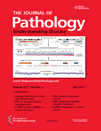
JOURNAL OF PATHOLOGY
Shaping the Future of Pathological ResearchWelcome to the Journal of Pathology, a premier academic publication specializing in the field of pathology and forensic medicine. Established in 1969 and published by Wiley, this journal has garnered significant recognition within the research community, reflected in its impressive ranking of #6 out of 208 in Scopus, placing it in the 97th percentile. The Journal of Pathology serves as a critical platform for disseminating cutting-edge research findings, innovative methodologies, and topical reviews that advance our understanding of diseases and their underlying mechanisms. With no open access charge, this esteemed journal is committed to maintaining the highest standards of scientific rigor and integrity. As a Q1 journal in its category for 2023, it continues to shape the field of pathology and contribute invaluable insights to researchers, medical professionals, and students alike. We invite you to explore the wealth of knowledge encapsulated in each issue and engage with the vibrant discussions that strive to propel the science of pathology forward.
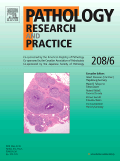
PATHOLOGY RESEARCH AND PRACTICE
Advancing the Frontiers of Pathological SciencePATHOLOGY RESEARCH AND PRACTICE is a premier journal in the field of pathology and forensic medicine, published by Elsevier GmbH in Germany. With a rich publication history since 1978 and an impressive convergence period extending to 2024, this journal serves as a vital resource for researchers and professionals dedicated to advancing the understanding of pathological processes. It holds notable rankings, including Q3 in Cell Biology and Q2 in Pathology and Forensic Medicine for 2023, reflecting its significance in the academic community. The journal aims to publish innovative research findings, reviews, and case studies, facilitating a deeper understanding of disease mechanisms and improving diagnostic practices. Authors and readers alike benefit from its reputable platform, noted for its challenging and rigorous peer-review process. By fostering a collaborative environment and providing open access options, PATHOLOGY RESEARCH AND PRACTICE continues to contribute meaningfully to the discourse within its respective fields, thereby appealing to a diverse audience of researchers, professionals, and students.
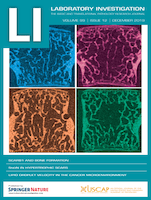
LABORATORY INVESTIGATION
Pioneering Discoveries in Cell and Molecular BiologyLaboratory Investigation is a premier academic journal published by Elsevier Science Inc, specializing in the fields of Pathology, Forensic Medicine, Cell Biology, and Molecular Biology. With its ISSN 0023-6837 and E-ISSN 1530-0307, this journal has been a significant contributor to scientific discourse since its inception in 1952, converging into its current form by 2024. It holds an impressive standing in its respective fields, featuring a 2023 Journal Rank of Q2 in both Cell Biology and Molecular Biology, and an elite Q1 ranking in Pathology and Forensic Medicine, reflecting its influence and quality of research, as seen in its Scopus ranks—17th out of 208 in Pathology and Forensic Medicine. Although it does not offer Open Access options, the journal remains a vital resource for researchers, professionals, and students who seek to disseminate and engage with high-caliber research findings. The importance of Laboratory Investigation is underscored by its commitment to advancing the understanding of laboratory and translational medicine, paving the way for innovations that enhance clinical practices.

Diagnostic Pathology
Fostering Innovation in Pathology for Global ImpactDiagnostic Pathology is a prominent open-access journal published by BMC, dedicated to advancing the field of pathology by providing a platform for high-quality research findings since its inception in 2006. Based in the United Kingdom, the journal covers a broad spectrum of topics within the realms of histology, pathology, and forensic medicine, facilitating discussions that are crucial for both clinical and laboratory settings. With an impressive impact factor that places it in the Q2 category across multiple categories including Histology and Miscellaneous Medicine, it ranks favorably in Scopus with notable positions in the 71st and 55th percentiles for Pathology and Histology respectively. As a valuable resource for researchers, professionals, and students alike, Diagnostic Pathology promotes the dissemination of cutting-edge studies and findings, thereby contributing significantly to the evolving landscape of medical science. The journal’s commitment to open access enhances its accessibility, ensuring that valuable research is freely available to a global audience.
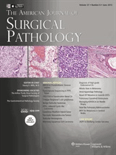
AMERICAN JOURNAL OF SURGICAL PATHOLOGY
Shaping the Future of Surgical Pathology TogetherThe American Journal of Surgical Pathology, published by Lippincott Williams & Wilkins, is a premier peer-reviewed journal serving as a vital resource for pathologists, surgeons, and researchers in the medical field. With an impressive impact factor reflective of its esteemed standing in the academic community, the journal ranks in the Q1 quartile for Anatomy, Pathology and Forensic Medicine, and Surgery as of 2023. The journal's Scopus rankings further highlight its significance, placing it within the top tiers in multiple medical disciplines. Established in 1977 and continuing through 2024, its scope encompasses groundbreaking research, critical reviews, and updates in surgical pathology, making it an essential tool for advancing the scientific community's understanding of disease mechanisms and therapeutic approaches. Researchers, clinicians, and students will find both comprehensive studies and innovative insights, ensuring they remain informed about the latest developments in surgical pathology.